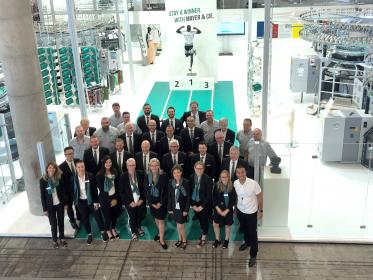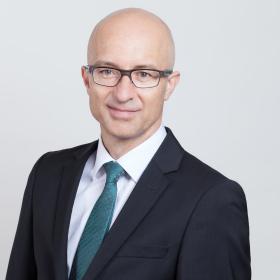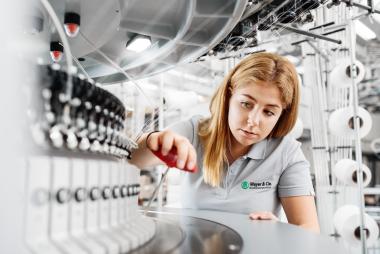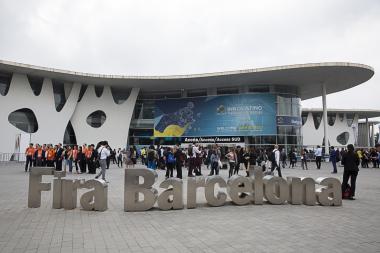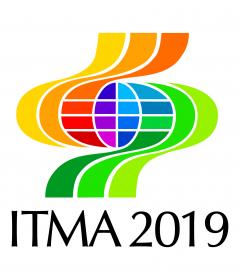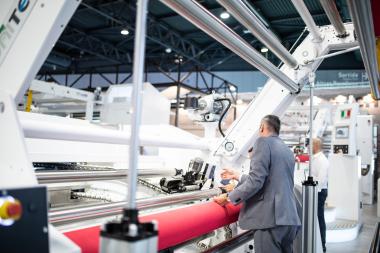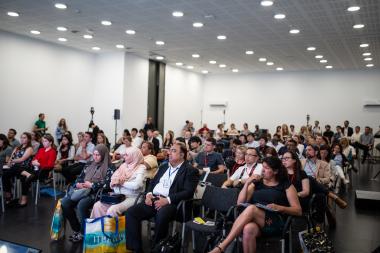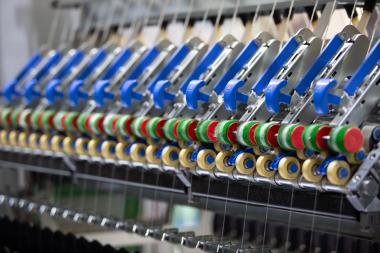Mayer & Cie.: “COVID-19 - A Challenge without a Blueprint”
Interview with Wolfgang Müller, Head of Sales & Service at Mayer & Cie. GmbH & Co. KG
At least Europe seems to be able to breathe a sigh of relief after weeks of lockdown during the corona pandemic. The textile industry, an industry that has lived globalisation for so many years, is facing the challenge of maintaining its place in the new normal and building on its previous performance as quickly as possible.
Textination talked to three company representatives along the textile chain about personal and operational experiences.
Wolfgang Müller, Head of Sales & Service at Mayer & Cie. GmbH & Co. KG will start the three-part series. The world market leader for circular knitting machines, founded in 1905 in Albstadt / Baden-Württemberg, employs around 400 people worldwide and today offers an international network of more than 80 sales and service representatives.
How have you felt about the corona era to date - as a company and personally?
What would you on no account want to go through again and what might you even consider maintaining on a daily basis?
The corona era is a challenge without a blueprint. Because it is not an economic crisis as previously understood we have no tried and tested solutions with which to react to the situation. Nevertheless, and this is my personal opinion, there is never only a downside even though the pandemic situation has, of course, had the worst conceivable effect on our order intake.
A positive aspect is that we are forced to deal with issues we would otherwise have put off until the future. Web meetings and virtual trade fairs instead of travelling half way round the world. We can use the time gained to optimise our processes.
When the lockdown began I personally had more time for myself and a few hours more sleep than otherwise. But that positive side effect is already history.
What has the pandemic meant for your company so far?
Let me go back a little further. The trade dispute between the United States and China and many other, smaller local conflicts led to the textile machinery market having faced an understandably most reluctant client base since 2018. After this rather lengthy lean period we noted from the beginning of 2020 a growing inclination to invest once more. Of course, corona abruptly interrupted that trend. So the pandemic hit us at a time when the industry was recovering. We now have a steady order intake once more, but at a lower level than we need if we are to fully utilise our production capacity. So after the summer holidays we will switch to short-time working until the situation is back to normal.
What adjustments or innovations to your product portfolio have you felt obliged by the pandemic to undertake?
Contact and travel bans have not only shown us how useful video conferences are; they have also demonstrated most vividly how important digital solutions are – and that we need to work on them intensively. Prior to the corona outbreak, we invested a great deal of time and knowledge in this area so that we were able to unveil knitlink at the 2019 ITMA 2019.
A Web shop for spare parts and our new service approach are both based on knitlink. Using a ticket system that we are developing from our CRM system along with digital measures in service support we can assist our customers faster and at less expense than previously. In addition, our customers will in future be able to record and analyse the production data of their Mayer circular knitting machines.
What are your views on global supply chains in the future, and will you be drawing consequences for your procurement policy?
We as suppliers noticed at the outset of the corona crisis in March that the desire for short supply chains on the part of clothing manufacturers was leading to more orders from countries closer to Europe. Now that the situation is hopefully starting to ease off, this trend is still apparent.
As for our own supply chain, throughout the entire lockdown phase we have had gratifyingly few problems and no downtimes whatever.
How do you rate the importance of partnerships within the industry in the future?
Does Covid-19 have the potential to promote the creation of new cooperation arrangements in the industry? Or have they already taken shape?
Cooperation arrangements can be a great enrichment. For over a year and a half we have been collaborating with a design studio in Amsterdam. Our partner Byborre not only develops designs of its own; it also supports sportswear and clothing manufacturers step by step in developing their textiles.
The customer uses his own partners and suppliers while Byborre supplies the machinery and parameters needed to manufacture the desired fabrics.
Byborre could be described as a kind of “translator,” interpreting between us, the machine manufacturers, and those who use the fabrics that are made on our machines.
We as engineers know of course what our machines are capable of accomplishing. Jointly with Byborre we coax new designs and uses out of these capabilities.
Apart from that we cooperate in various bodies such as the VDMA’s Marketing and Trade Fair Committee.
These, however, are not cooperation arrangements arising from or as a consequence of Covid-19. We have no such cooperation to report.
What initiatives or approaches for your industry would you welcome for the near future?
A positive mention must be made of offers by the state government to assist with digitisation projects that we must all take forward.
A strengthening of regional production would also be desirable. That said, even I cannot imagine how that could be achieved other than for high-quality or niche products.
What would you like to see as part of the German textile industry?
Do you feel that the status of the German textile industry has changed as a result of the pandemic, especially in respect of public procurement?
Although “textile” is part of our description as textile machinery manufacturers, our actual home is in the second part of the name – in mechanical engineering. Its status in Germany is, as is known, very high.
That of the textile industry is, from my external vantage point, unchanged. At the beginning of April, when face masks were desperately sought, there were many good intentions, but German firms that offered to manufacture them were refused long-term assurances by the government.
So naturally nobody invested in the idea and everything will probably remain as it is, with the price reigning supreme and competition continuing unabated.
Until now the big issues have been globalisation, sustainability / climate change / environmental protection, digitisation, the labour market situation and so on.
Where do they stand now and how must we rate them against the backdrop of the Covid-19 pandemic?
The overriding issue right now is Covid-19, and everything else is subordinated to it. At the same time it functions like a magnifying glass. Take precarious jobs, for example. The high rates of infection in abattoirs have meant that they can no longer be ignored. Covid-19 has also created facts in respect of environmental protection. Next to nobody is flying, people are working from home and doing less shopping. That leads to lower emissions. The ailing global economy is a blessing for the planet. Germany too is likely to be on climate target for 2020; without corona we would have failed to do so. As for globalisation, it is at least marking time as regional production fills part of the bill.
How long that will continue to be the case remains to be seen, of course, but it is clear that we can be extremely flexible if we need to be.
What lessons are to be learnt in respect of these targets for the post-corona era?
There is unlikely to be a “post-corona era” inasmuch as we will no longer get rid of the virus. We must learn to cope with it.
The virus or rather the restrictions it has imposed on us have forced us to be creative. We must deal with existing processes differently – both in private life and professionally. By that I mean such everyday activities as shopping as well as Web meetings and working at home, which was not previously a widespread option at our company. They have certainly made us more efficient.
Another realisation applies to us as an SME just as it does to politics. We have an opportunity to master the crisis and maybe even gain in strength and size from it. But only because we have invested sensibly when times were good and above all managed our business soundly and solidly.
This interview was conducted by Ines Chucholowius, CEO Textination GmbH



